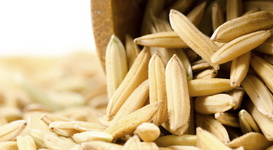
Scientists Develop Rice with High Folate Stability
September 30, 2015| |
 Researchers from Ghent University in Belgium have succeeded in stabilizing folates in biofortified rice. The research team developed a new rice prototype, and applied two strategies for the folate to remain stable for long storage. The first strategy involved binding folates with a folate binding protein. This protein is well studied in mammals, but unknown in plants. It occurs in milk and protects folate from degradation. Based on a folate binding protein from bovine milk, the folate content of rice remained stable upon long storage.
Researchers from Ghent University in Belgium have succeeded in stabilizing folates in biofortified rice. The research team developed a new rice prototype, and applied two strategies for the folate to remain stable for long storage. The first strategy involved binding folates with a folate binding protein. This protein is well studied in mammals, but unknown in plants. It occurs in milk and protects folate from degradation. Based on a folate binding protein from bovine milk, the folate content of rice remained stable upon long storage.
The second strategy consisted of the stimulation of the last step in folate production, which extends the tail of the folate molecule. This promotes cellular retention and binding to folate dependent proteins. Aside from enhancing folate stability, the new gene combinations also increased folate levels by up to 150-fold than those found in regular rice.
All genes used in the study were placed next to each other on a single piece of DNA, the genetic material can easily be transferred to edible rice varieties. It is also easier to make combinations with other interesting traits, such as enhancement of other vitamins or minerals, such as iron. This technology can also be used in other crops, both cereals (wheat, sorghum) and non-cereals (potato, banana).
For more information, read the news release at the Ghent University website.
| |
Biotech Updates is a weekly newsletter of ISAAA, a not-for-profit organization. It is distributed for free to over 22,000 subscribers worldwide to inform them about the key developments in biosciences, especially in biotechnology. Your support will help us in our mission to feed the world with knowledge. You can help by donating as little as $10.
-
See more articles:
-
News from Around the World
- U.S. and China Commit to Further Improve Biotech Approval Process
- Syrian War Prompts First Withdrawal of Seeds from Svalbard Global Seed Vault
- 3,000 Rice Genomes Data Available on the AWS Cloud
- Zambia Hosts Africa Green Revolution Forum 2015
- Argentine Government Seeks Citizen Opinion on New GE Crops
- Scientists Reveal Why Black Rice is Black
- USDA APHIS Opens Public Comment Period for GE Wheat Field Trials
- South Australia Farmers Call for Permission to Grow GE Crops
- Stakeholders from Africa Visit Bt Cotton Fields in India
- Scientists Develop Rice with High Folate Stability
-
Research Highlights
- A Vernalization Pathway Gene from Soybean Promotes Flowering in Arabidopsis
- Expression of Genes Associated with Drought Traits Improves Drought Adaptation in Peanut
- GE Tomato Expressing Bacterial Gene XnGroEL Shows Enhanced Resistance to Armyworm and Abiotic Stresses
-
Beyond Crop Biotech
- Scientists Crack Genomes of Microscopic Worms Vital for Agri
-
Resources
- New Publication: 50 Biotech Bites
-
Read the latest: - Biotech Updates (February 11, 2026)
- Gene Editing Supplement (January 28, 2026)
- Gene Drive Supplement (February 22, 2023)
-
Subscribe to BU: - Share
- Tweet
